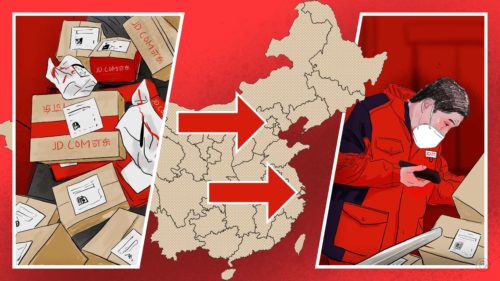WHO in Wuhan: A refusal to share raw data, or ‘standard scientific debate’?
WHO scientists had arguments in Wuhan over access to detailed patient data. But they appear to disagree about whether those debates amount to a “refusal” by China to share information essential to tracing the origin of COVID-19.

The task of World Health Organization (WHO) investigators on their recent visit to Wuhan was not an easy one. Even under the best of circumstances, it would have involved tricky politics. With Beijing long pushing a sanitized narrative of its COVID-19 response, and putting political controls on research into the early days of the outbreak in Wuhan, no one expected the WHO investigators to have truly unrestricted access to Chinese data.
Reports that arguments erupted among scientists, then, are unsurprising.
- Per the New York Times, “disagreements over patient records and other issues were so tense that they sometimes erupted into shouts among the typically mild-mannered scientists on both sides.”
- Earlier, the Wall Street Journal reported that WHO investigators had learned that about “90 people were hospitalized with COVID-19-like symptoms in central China in the two months before the disease was first identified in Wuhan in late 2019.”
- “China refused to provide WHO team with raw data on early COVID cases, team member says,” Reuters then added, citing Dominic Dwyer, an Australian infectious diseases expert on the WHO team.
- “The WHO scientists were frustrated by the Chinese government’s reluctance to explain how they had gathered the data, according to interviews with team members,” the NYT says.
But not all WHO team members agreed with the NYT characterization:
- “I found trust & openness w/ my China counterparts. We DID get access to critical new data throughout. We DID increase our understanding of likely spillover pathways,” said team member Peter Daszak on Twitter.
- “We DID build up a good relationship in the Chinese/Int Epi-team,” added another team member, Thea Fisher, saying the NYT had “intendedly twisted” the views of scientists they interviewed.
- “It was a standard scientific debate,” said WHO mission chief Ben Embarek, in an interview with Science.
Officials in the U.S., China, and elsewhere seized on the controversy to point fingers:
- A statement by U.S. National Security Advisor Jake Sullivan: “We have deep concerns…It is imperative that this report be independent, with expert findings free from intervention or alteration by the Chinese government. To better understand this pandemic and prepare for the next one, China must make available its data from the earliest days of the outbreak.”
- The British foreign minister, Dominic Raab, said that he shared the U.S. concerns.
- The Chinese Embassy in Washington released a statement (English, Chinese) accusing the U.S. of having “gravely damaged international cooperation on COVID-19” in recent years, in response to Sullivan’s statement.
- Xinhua News Agency published a commentary titled, “NYT should stop distorting facts to suit own anti-China agenda.”
See also:
- W.H.O. researcher seeking coronavirus origins on his trip to China / NYT (porous paywall)
An interview with Peter Daszak. See also a tweet from him thanking the NYT for “setting the record straight,” and adding that if he had been asked directly whether China refused to hand over data, he would have said “no.” - COVID: U.K. scientist defends WHO fact-finding mission to Wuhan / BBC






